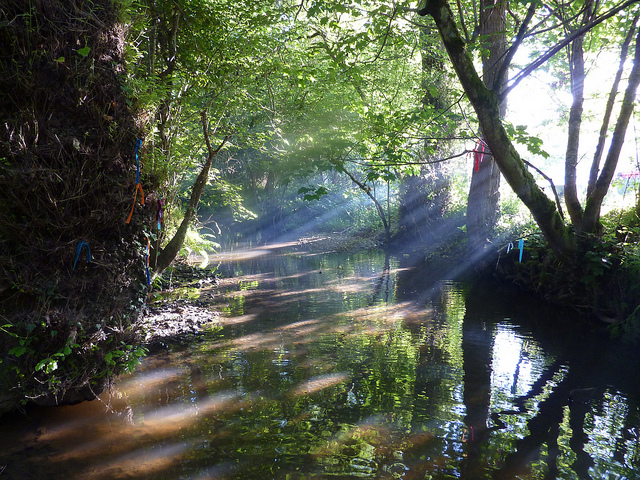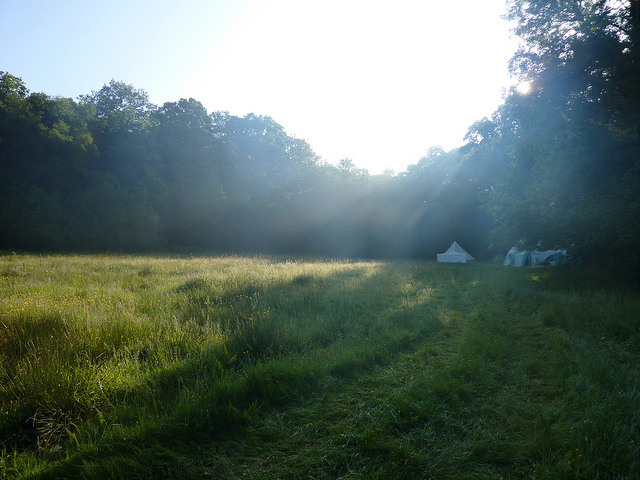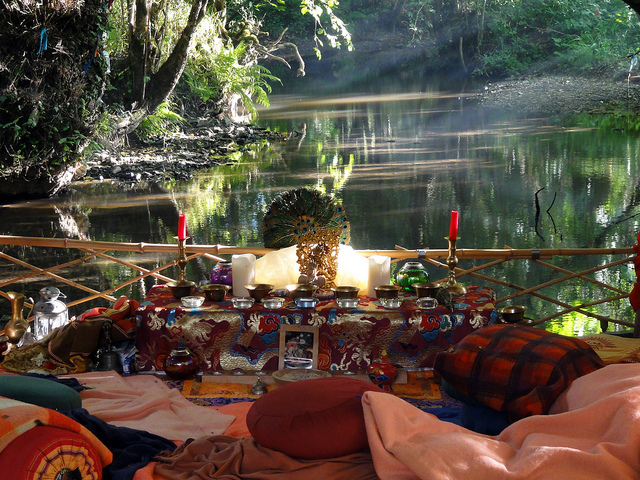Image: Padmapani 2011
On 20th May 2016 Buddhafield are holding the annual Total Immersion month-long silent retreat, ending on 17th June. I caught up with Kamalashila to ask him a little more about what the retreat is all about.
How did Total Immersion retreats come into being?
The original Total immersion retreat was held at Dhanakosa [Retreat Centre in Scotland] led by myself, Vessantara and Viveka in around 2005. I thought it would work in Buddhafield and we started the following year. I have led them ever since. Some years ago Paramananda got interested and we started alternating years.
What are the benefits of retreats that are held in a natural setting?
If you live in nature, nature teaches you how to be natural. We come out of a highly artificial world into retreat. There are few straight lines and flat surfaces in nature, and it is not designed for convenience. This means we have to be much more aware even to live a simple life. There is an element of freshness and spontaneity that is unique. All these things generate the very best conditions for meditation reflection and generous behaviour – with the right teaching setup I think retreats in nature can even be better than a dedicated retreat centre.
What effect does spending such a long time in silence have?
There will still be verbal teaching, questions and ritual chanting, so the silence is not absolute. But… Peace. Clarity. Confidence. Love. Silence doesn’t mean we don’t communicate or look at one another. We get to know one another deeply by relaxing in each other’s company.
Are there teaching elements to these retreats? How do the retreat leaders support people’s own self-reflection process?
There’s a main daily teaching and question-answer session, as well as smaller, more off the cuff teachings throughout the day — plus of course one-to-one practice reviews for everyone.
Do you have any advice for people who are considering coming on the retreat but haven’t done a silent retreat before or haven’t spent such a long time on retreat before?
For most practitioners, longer retreats are easier, simply because there is more time to settle in and to relax with everyone in the community. But it’s also possible to come for just the first two weeks.
Image: Seán Quigley
What surprises you the most about the Total Immersion retreat?
That every year, Padmapani manages to upgrade even further his already incredible Naga Shrine. When we first started it was a little booth on a plank next to the stream. Last time I was there it was big enough for the entire retreat to do a puja right in the river itself – and the shrine itself was extraordinary. Perhaps not actually surprising (I know Padma very well) but definitely amazing.
Even after all this time leading these retreats, and with so much meditation experience, do you still benefit yourself from the Total Immersion retreat?
I always learn new and deep things about the Dharma from being in a fully natural environment over time. Nature is humbling and grounding as well as being incredibly beautiful, and this shifts your whole perspective — first on the elusive ‘self’, and then on the nature of existence. Getting to that takes time though. You need to be living in one place long enough to be part of the environment — then you start to understand. Usually we are external observers and that doesn’t teach us much that’s useful. What one learns is not information – which we already have plenty of – but about what we are and what our place is.
You’ve said a little about the difference between Buddhafield retreats and retreats at Centres – can you say any more? i.e. What does Buddhafield do differently and why is it worth people engaging with this different approach?
I think the previous answer applies here too. It is about being immersed in nature to the point where you realise you are part of it. And Buddhafield crews know from long deep experience of living on the land how to support everyone to do that. Their expertise and ingenuity is very impressive.
What do people tend to experience moving from the Total Immersion retreat back into daily life? What benefit does an extended period of meditation such as this have on people’s day-to-day life in the modern world?
People will vary but most will experience a lasting boost to their clarity and confidence. Leaving the beauty of retreat may be a bit challenging for some, but even that is educative and in the long term will make our lives more authentic, natural and real.
Bookings are now open for our Total Immersion retreat for both two week and month-long options.
The retreat starts on 20th May 2016, with the two week option ending on 3rd June and the whole retreat ending on 17th June.



